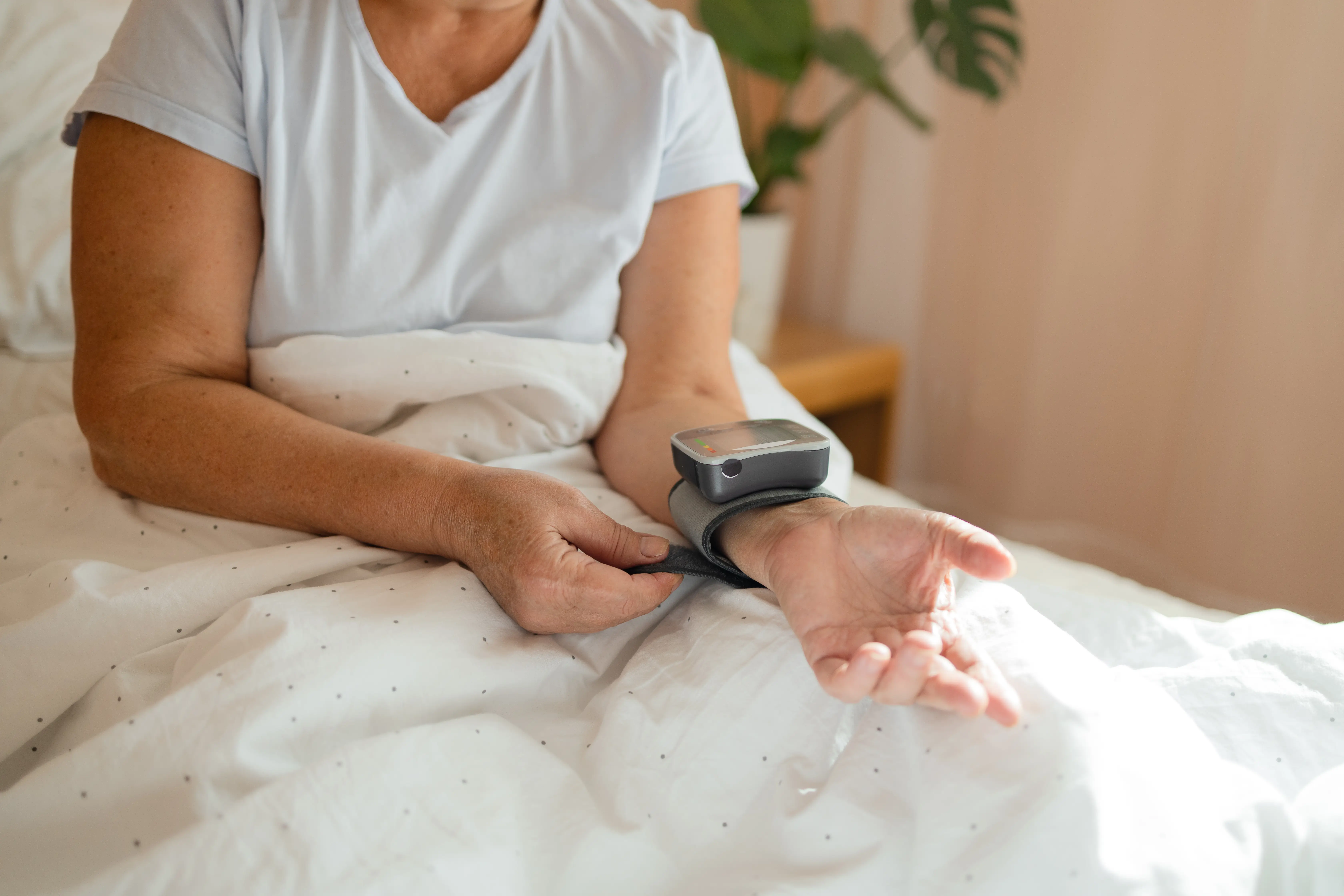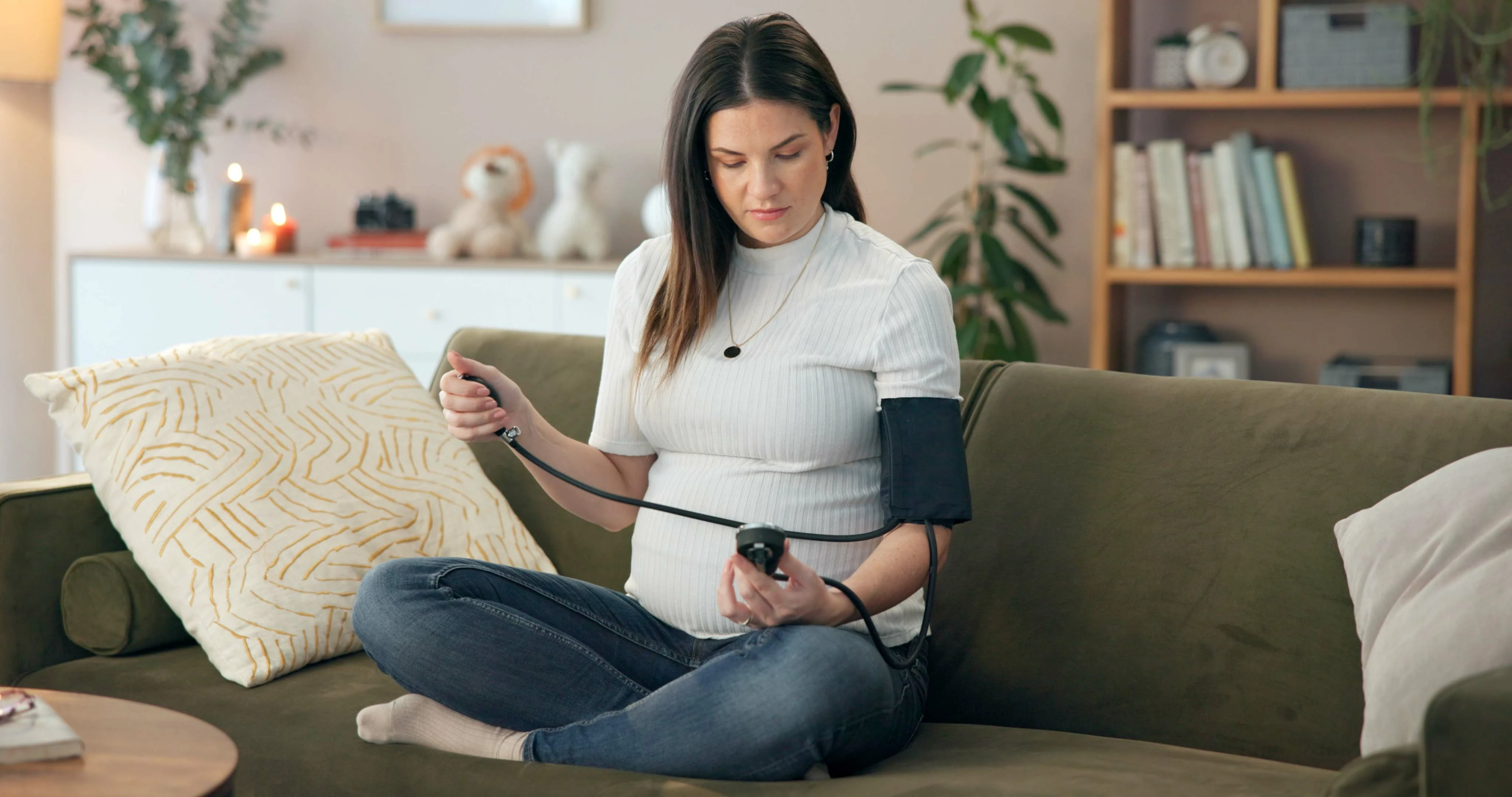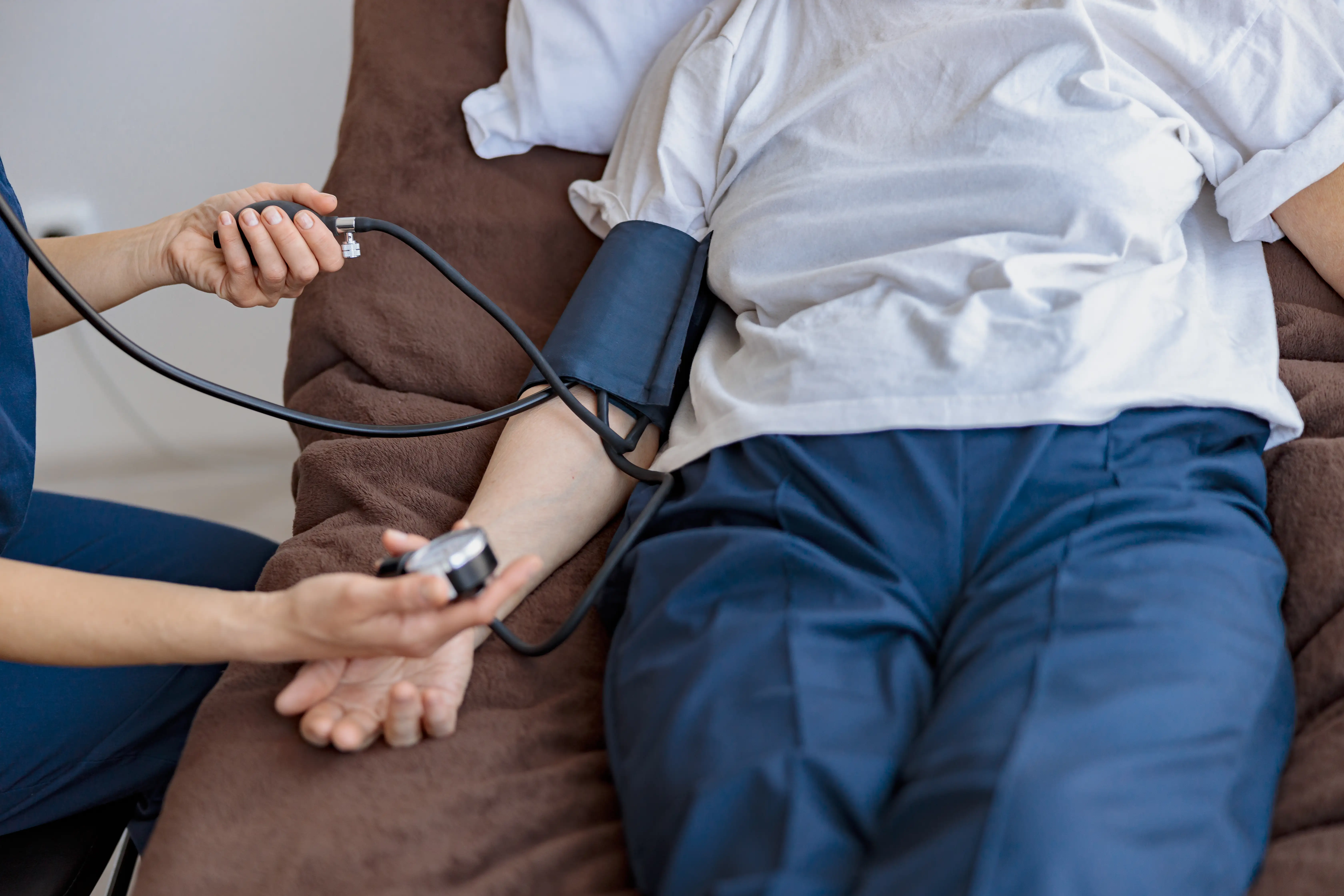Sleep is essential for overall health, yet many people fail to get enough rest due to demanding lifestyles, stress, or underlying sleep disorders. While occasional sleepless nights may seem harmless, chronic sleep deprivation can have serious consequences—one of the most significant being high blood pressure (hypertension).
In this article, we explore the connection between sleep and blood pressure, the physiological effects of sleep deprivation, and ways to improve sleep for better heart health.
Understanding Blood Pressure and Sleep

What is blood pressure, and why does it matter?
Blood pressure is the force exerted by circulating blood against the walls of the arteries. It is a crucial indicator of cardiovascular health and is measured in two values:
- Systolic Pressure (the top number): The pressure when the heart beats and pushes blood through the arteries.
- Diastolic Pressure (the bottom number): The pressure when the heart rests between beats.
A normal blood pressure reading is typically around 120/80 mmHg. If blood pressure is too high (hypertension), it can put excessive strain on the heart and blood vessels, increasing the risk of heart disease, stroke, and kidney problems.
Conversely, low blood pressure (hypotension) can lead to dizziness, fainting, and inadequate blood flow to vital organs.
Blood pressure fluctuates throughout the day, influenced by physical activity, diet, and sleep. Understanding these fluctuations and their impact on health is essential for maintaining cardiovascular well-being.
How Sleep Helps Regulate Blood Pressure
Sleep plays a critical role in cardiovascular health by allowing the body to regulate blood pressure naturally. During restful sleep, particularly during the non-rapid eye movement (NREM) stage, blood pressure decreases, giving the heart and blood vessels time to recover from daily stressors. This nightly dip in blood pressure is essential for overall heart health.
Poor sleep quality or insufficient sleep can disrupt this process, leading to higher average blood pressure levels and an increased risk of hypertension. Sleep disorders such as insomnia, obstructive sleep apnea (OSA), and restless leg syndrome can further contribute to blood pressure dysregulation by causing frequent awakenings and preventing restorative sleep.
Key ways sleep affects blood pressure include:
- Blood Vessel Relaxation: Sleep helps blood vessels dilate and maintain flexibility, reducing strain on the cardiovascular system.
- Stress Hormone Regulation: Poor sleep increases cortisol and adrenaline, stress hormones that can lead to elevated blood pressure.
- Autonomic Nervous System Balance: Sleep allows the body to shift from the "fight or flight" response (sympathetic nervous system) to a "rest and digest" state (parasympathetic nervous system), helping maintain a healthy blood pressure balance.
Symptoms of High Blood Pressure
High blood pressure (hypertension) is often called the "silent killer" because it may not cause noticeable symptoms until it reaches dangerous levels. However, in some cases, people may experience:
Headaches
Frequent or severe headaches, especially in the morning, may be a sign of elevated blood pressure affecting blood flow to the brain.
Dizziness or Lightheadedness
Sudden dizziness or feeling faint may occur due to fluctuations in blood pressure, especially when standing up too quickly.
Blurred or Double Vision
High blood pressure can put strain on the blood vessels in the eyes, leading to vision disturbances or even long-term damage if left untreated.
Shortness of Breath
Difficulty breathing can occur when high blood pressure affects the heart and lungs, potentially leading to heart failure if unmanaged.
Chest Pain
Chest pain can be a warning sign of dangerously high blood pressure or related heart conditions. Immediate medical attention is necessary if it occurs.
Nosebleeds
Although not always directly caused by hypertension, frequent nosebleeds may indicate excessive pressure in the blood vessels.
Fatigue or Confusion
Heart Palpitations or Irregular Heartbeat
Chronic tiredness, brain fog, or difficulty concentrating may result from high blood pressure reducing oxygen flow to the brain.
An unusually fast or irregular heartbeat may indicate that high blood pressure is putting stress on the heart.
Nausea
Feeling nauseous, especially when combined with dizziness or headaches, can be a sign of severe hypertension requiring immediate attention.
Causes of High Blood Pressure
Primary (essential) hypertension and secondary hypertension are two categories of factors that can cause high blood pressure:
Genetics
A family history of hypertension increases the likelihood of developing high blood pressure due to inherited traits affecting blood vessel function.
Aging
As people age, arteries naturally become less flexible, leading to increased resistance in blood flow and higher blood pressure levels.
High Salt Intake
Excess sodium in the diet causes the body to retain water, increasing blood volume and putting more pressure on blood vessels.
Poor Diet
Diets high in processed foods, unhealthy fats, and added sugars contribute to weight gain, inflammation, and higher blood pressure.
Lack of Exercise
A sedentary lifestyle weakens the heart and blood vessels, making it harder for the body to regulate blood pressure effectively.
Obesity
Excess weight increases strain on the heart, leading to higher blood pressure and a greater risk of cardiovascular disease.
Chronic Stress
Long-term stress keeps the body in a heightened state of alertness, increasing heart rate and blood pressure over time.
Excessive Alcohol Consumption
Drinking alcohol in excess can raise blood pressure by affecting the nervous system and contributing to weight gain.
Smoking
Tobacco use damages blood vessels, reduces oxygen levels, and increases the risk of hypertension and heart disease.
How Lack of Sleep Contributes to High Blood Pressure

Lack of sleep, also known as sleep deprivation, contributes to high blood pressure by causing the following effects.
Increased Sympathetic Nervous System Activity
The sympathetic nervous system (SNS) is responsible for the body's "fight or flight" response. When sleep is inadequate, the SNS becomes overactive, leading to increased heart rate, narrowed blood vessels, and elevated blood pressure.
This prevents the normal nighttime dip in blood pressure, putting extra strain on the cardiovascular system.
Disruption of the Body’s Circadian Rhythm
The body follows a 24-hour biological clock (circadian rhythm) that regulates sleep-wake cycles and blood pressure patterns. Normally, blood pressure decreases at night to allow the heart and blood vessels to recover.
Increased Inflammation
Lack of sleep triggers chronic low-grade inflammation, which damages blood vessels and contributes to the development of hypertension. This inflammation makes arteries less flexible and more prone to plaque buildup, increasing the risk of atherosclerosis, heart disease, and stroke over time.
Impaired Endothelial Function
The endothelium, or the inner lining of blood vessels, plays a key role in regulating blood pressure. Sleep deprivation reduces the production of nitric oxide, a molecule that helps blood vessels relax.
Without proper endothelial function, arteries become stiff and narrow, making it harder for blood to flow smoothly, which raises blood pressure.
Increased Risk of Weight Gain and Obesity
Poor sleep disrupts the balance of hormones that control hunger and metabolism. It decreases leptin, which suppresses appetite, and increases ghrelin, which stimulates hunger.
This hormonal imbalance leads to overeating, weight gain, and a higher risk of obesity—one of the most significant risk factors for high blood pressure.
Impaired Kidney Function
The kidneys regulate blood pressure by controlling fluid balance and sodium levels. Sleep deprivation interferes with this process, causing the body to retain more sodium and fluids, which raises blood pressure.
Over time, chronic sleep loss can contribute to kidney disease, further increasing the risk of hypertension and cardiovascular complications.
Sleep Deprivation and Hypertension

The relationship between sleep and blood pressure may create a vicious cycle. High blood pressure can worsen sleep quality by causing conditions like restless leg syndrome, sleep apnea, or nighttime urination. These conditions further disturb sleep, perpetuating the cycle of poor sleep and elevated blood pressure.
For instance, individuals with hypertension may experience more fragmented sleep due to nocturnal symptoms like frequent bathroom trips or discomfort from circulatory problems. As their sleep quality decreases, their blood pressure may rise even further, exacerbating both the sleep problems and hypertension.
Sleep Disorders That Increase the Risk of Hypertension
Several sleep disorders have been linked to an increased risk of high blood pressure. These conditions disrupt normal sleep patterns, preventing the body from properly regulating blood pressure during rest.
Obstructive Sleep Apnea (OSA)
OSA is one of the most significant sleep disorders associated with hypertension. It occurs when the airway becomes partially or completely blocked during sleep, causing repeated pauses in breathing.
This leads to oxygen deprivation, which triggers the release of stress hormones that raise blood pressure. Untreated OSA significantly increases the risk of chronic hypertension, heart disease, and stroke.
Insomnia
Chronic insomnia, characterized by difficulty falling or staying asleep, can contribute to elevated blood pressure. Poor sleep quality keeps the sympathetic nervous system in a heightened state, leading to sustained high blood pressure levels.
Over time, insomnia can increase the risk of cardiovascular issues, especially when combined with other risk factors like stress and anxiety.
Restless Leg Syndrome (RLS)
RLS causes an uncontrollable urge to move the legs, particularly at night. This condition leads to frequent sleep disruptions, preventing restorative sleep and contributing to elevated blood pressure.
Shift Work Sleep Disorder (SWSD)
People who work night shifts or rotating schedules often experience SWSD, which disrupts the body's natural circadian rhythm. Irregular sleep patterns prevent proper blood pressure regulation, increasing the risk of hypertension and cardiovascular disease.
How much sleep do you need to maintain healthy blood pressure?
It is recommended that adults get 7–9 hours of quality sleep per night to support cardiovascular health. Sleeping fewer than six hours per night has been linked to an increased risk of hypertension, while excessive sleep (more than nine hours) may also negatively affect heart health in some individuals.
For optimal blood pressure regulation, it’s important to maintain a consistent sleep schedule and practice habits that promote deep, restorative sleep. People with existing hypertension or risk factors should prioritize sleep as a fundamental part of their heart health routine.
Tips to Improve Sleep and Lower Blood Pressure

For those worried about sleep's effect on blood pressure, there are several ways to improve sleep and cardiovascular health:
Prioritize Sleep
Set a consistent bedtime and wake-up time, even on weekends. Going to bed and waking up at the same time each day helps regulate your circadian rhythm, making it easier to fall and stay asleep.
Optimize Sleep Environment
Create a sleep-friendly bedroom by keeping it cool, dark, and quiet. Use blackout curtains, white noise machines, or earplugs to minimize disruptions. Investing in a comfortable mattress and pillows can also improve sleep quality.
Limit Stimulants
Avoid caffeine, nicotine, and alcohol in the hours leading up to bedtime. Caffeine and nicotine are stimulants that can keep you awake, while alcohol may initially make you drowsy but disrupts deep sleep later in the night.
Practice Relaxation
Engage in calming activities before bed, such as reading, meditation, deep breathing, or gentle stretching. Reducing screen time at least an hour before bed can also help, as blue light from phones and tablets interferes with melatonin production.
Exercise Regularly
Regular physical activity can improve sleep quality and lower blood pressure. Aim for at least 30 minutes of moderate exercise most days of the week, but try to avoid intense workouts right before bed, as they may be too stimulating.
Manage Stress
Chronic stress can contribute to both poor sleep and high blood pressure. Finding healthy ways to manage stress—such as yoga, mindfulness, journaling, or talking to a therapist—can improve both sleep quality and heart health.
When to Seek Medical Help for Sleep and Blood Pressure Issues
Recognizing when to seek medical attention for sleep disturbances and high blood pressure is crucial for preventing serious health complications.
If you experience persistent sleep issues alongside abnormal blood pressure readings, consulting a healthcare professional can help identify underlying conditions and provide appropriate treatment.
Persistent High Blood Pressure
If your blood pressure remains consistently elevated (above 130/80 mmHg), despite lifestyle changes, or if it reaches dangerously high levels (above 180/120 mmHg), seek medical attention immediately. Chronic hypertension increases the risk of heart disease, stroke, and kidney problems.
Severe or Chronic Sleep Problems
Frequent difficulty falling or staying asleep, excessive daytime sleepiness, or feeling unrested even after a full night’s sleep may indicate an underlying sleep disorder. Chronic sleep disturbances can contribute to high blood pressure and other cardiovascular risks.
Signs of Obstructive Sleep Apnea (OSA)
If you or a loved one notice loud snoring, choking or gasping for air during sleep, morning headaches, or excessive daytime fatigue, you may have OSA. Untreated sleep apnea can significantly raise blood pressure and increase the risk of heart disease and stroke.
Dizziness, Chest Pain, or Shortness of Breath
If you experience chest pain, shortness of breath, severe headaches, dizziness, or vision problems along with high blood pressure, seek immediate medical attention. These could be signs of a hypertensive crisis or other serious health conditions.
Unexplained Fatigue or Mood Changes
Chronic sleep deprivation can lead to fatigue, irritability, depression, or trouble concentrating. If these symptoms persist and interfere with daily life, a doctor can help determine if an underlying sleep disorder or blood pressure issue is contributing.
Medication Side Effects
If you are taking blood pressure medication and experience side effects like dizziness, fatigue, or worsening sleep issues, consult your doctor. Adjustments to your medication or dosage may be needed to improve both sleep and blood pressure management.
FAQs
How does lack of sleep contribute to high blood pressure?
Sleep deprivation affects the body's ability to regulate blood pressure by keeping the nervous system in a heightened state. When you don’t get enough sleep, the sympathetic nervous system remains overactive**, increasing heart rate** and tightening blood vessels.
How many hours of sleep do you need to maintain healthy blood pressure?
Most adults should aim for 7–9 hours of quality sleep per night to support cardiovascular health. Consistently getting fewer than six hours has been linked to a higher risk of developing high blood pressure. Poor sleep quality—such as frequent waking or restless sleep—can also negatively impact blood pressure regulation.
Can sleep disorders like sleep apnea increase blood pressure?
Yes, obstructive sleep apnea (OSA) is strongly linked to high blood pressure. Sleep apnea causes repeated pauses in breathing during sleep, leading to low oxygen levels and increased stress hormones that raise blood pressure.
Does poor sleep quality affect blood pressure even if I get enough hours of sleep?
Yes, even if you get the recommended 7–9 hours of sleep, poor sleep quality can still impact blood pressure. Frequent awakenings, restless sleep, or disruptions in deep sleep stages can prevent the body from properly regulating blood pressure. Factors like stress, excessive screen time, caffeine, or underlying sleep disorders can reduce sleep quality.
Can improving sleep habits help lower high blood pressure?
Yes, improving sleep quality can significantly lower blood pressure and reduce cardiovascular risks. Maintaining a consistent sleep schedule, avoiding stimulants like caffeine before bed, and creating a comfortable sleep environment can help regulate blood pressure. Regular exercise, stress management, and limiting screen exposure before bedtime also promote better sleep.
When should I see a doctor about sleep-related high blood pressure?
You should see a doctor if you experience persistent sleep problems alongside high blood pressure readings. Symptoms like chronic insomnia, loud snoring, excessive daytime sleepiness, chest pain, or dizziness may indicate a more serious issue, such as sleep apnea or secondary hypertension.
Conclusion
Getting enough quality sleep is just as important as maintaining a healthy diet and exercising regularly when it comes to controlling blood pressure. Chronic sleep deprivation can lead to persistent high blood pressure by overactivating the nervous system, increasing inflammation, and disrupting the body's natural rhythms.
Jessica H.
Jessica is a reviewer, writer, and sleep enthusiast at Sleepiverse. Jessica graduated with her master's degree in Nursing research and education. She is a registered nurse and currently works in the Intensive Care Unit. Since becoming a nurse, Jessica has worked the night shift, which means a disrupted sleep schedule. Knowing she needed to function at her best while caring for patients at night, she spent a lot of time researching how to sleep well with a difficult schedule.


